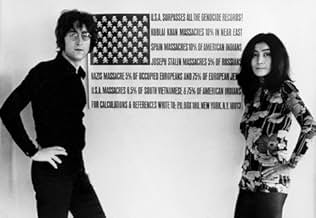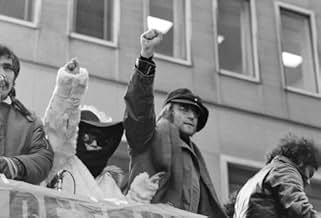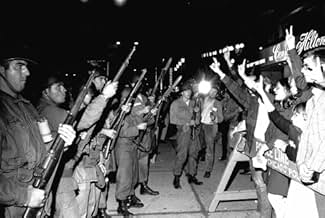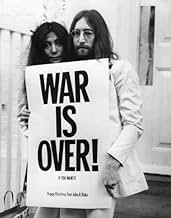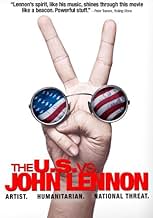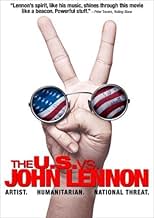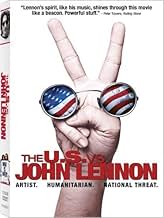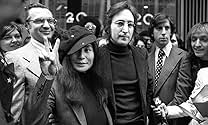AVALIAÇÃO DA IMDb
7,3/10
5,7 mil
SUA AVALIAÇÃO
Adicionar um enredo no seu idiomaA documentary on the life of John Lennon, with a focus on the time in his life when he transformed from a musician into an antiwar activist.A documentary on the life of John Lennon, with a focus on the time in his life when he transformed from a musician into an antiwar activist.A documentary on the life of John Lennon, with a focus on the time in his life when he transformed from a musician into an antiwar activist.
- Direção
- Roteiristas
- Artistas
- Prêmios
- 2 indicações no total
John Lennon
- Self
- (cenas de arquivo)
- Direção
- Roteiristas
- Elenco e equipe completos
- Produção, bilheteria e muito mais no IMDbPro
Avaliações em destaque
STAR RATING: ***** Saturday Night **** Friday Night *** Friday Morning ** Sunday Night * Monday Morning
During the 1960s, John Lennon was one part of The Beatles, still almost certainly the most successful British band today. But it was also the time of the Vietnam war and of the 'flower power' generation, which he got very much caught up in, much to the furore of the Nixon administration. This film follows John's escapades during this time, from his peace activist activities, his romance with conceptual artist Yoko Ono who showed him some far-out methods of drawing attention to his cause, his 'stay in bed' crusade after the failure of flower power, his support of the Black Panthers, his far out views on materialism and spirituality and, of course, the Nixon administration's paranoia about his influence on the youth of America at the time, which lead to them tapping his phone and having him followed and, eventually, attempting to get him deported on a bullsh!t possession of marijuanna charge.
Although many of Nixon's worries concerning Lennon were probably a load of hot air, it's doubtless the huge role the man played in inspiring a generation of young people to adopt the ideals of peace and love for your fellow man, which the Nixon administration, hell-bent on sending many young men off to die for a cause they didn't understand let alone believe in, was understandably rattled about. And so it's an interesting idea to make a documentary like this, highlighting the huge influence the man had and the increasingly drastic steps that were taken to try and put a dent in it. Talking heads include figures from the FBI, those caught up in the peace demonstrations, a platoon leader in Vietnam as well as Yoko Ono herself and the then leader of the Black Panthers. It all makes for a very interesting and revealing expose of events involving Lennon at the time, and it all plays out in much this way too. The one problem is that it veers off course from the source material at the time in some parts, leaving the theme of Nixon's harassment of Lennon and playing more like your typical biography of Lennon's life and, in turn, becomes a little meandering and boring, especially towards the end.
Nonetheless, it certainly doesn't fail as a documentary and still maintains an interesting and relevant theme through-out that Lennon enthusiasts and others as well will be very interested in seeing. ***
During the 1960s, John Lennon was one part of The Beatles, still almost certainly the most successful British band today. But it was also the time of the Vietnam war and of the 'flower power' generation, which he got very much caught up in, much to the furore of the Nixon administration. This film follows John's escapades during this time, from his peace activist activities, his romance with conceptual artist Yoko Ono who showed him some far-out methods of drawing attention to his cause, his 'stay in bed' crusade after the failure of flower power, his support of the Black Panthers, his far out views on materialism and spirituality and, of course, the Nixon administration's paranoia about his influence on the youth of America at the time, which lead to them tapping his phone and having him followed and, eventually, attempting to get him deported on a bullsh!t possession of marijuanna charge.
Although many of Nixon's worries concerning Lennon were probably a load of hot air, it's doubtless the huge role the man played in inspiring a generation of young people to adopt the ideals of peace and love for your fellow man, which the Nixon administration, hell-bent on sending many young men off to die for a cause they didn't understand let alone believe in, was understandably rattled about. And so it's an interesting idea to make a documentary like this, highlighting the huge influence the man had and the increasingly drastic steps that were taken to try and put a dent in it. Talking heads include figures from the FBI, those caught up in the peace demonstrations, a platoon leader in Vietnam as well as Yoko Ono herself and the then leader of the Black Panthers. It all makes for a very interesting and revealing expose of events involving Lennon at the time, and it all plays out in much this way too. The one problem is that it veers off course from the source material at the time in some parts, leaving the theme of Nixon's harassment of Lennon and playing more like your typical biography of Lennon's life and, in turn, becomes a little meandering and boring, especially towards the end.
Nonetheless, it certainly doesn't fail as a documentary and still maintains an interesting and relevant theme through-out that Lennon enthusiasts and others as well will be very interested in seeing. ***
For those who are too young to remember the real John Winston Ono Lennon -- this film is a good introduction to why he mattered so, why so many people were (and are) devoted to him as an artist and a man, why he was truly the most original voice of his generation.
The film is not perfect -- but in its defense, it covers an extraordinary amount of material and does it well.
Lennon lived 100 lifetimes between 1969 and 1975.
This film concentrates on the biggest conflict he faced at that time: his struggles to remain in the US, and the right-wing paranoia (exemplified by FBI director J Edgar Hoover and Nixon's hatchet man, John Ehrlichman.)
Lennon's sincerity, his naiveté, his charisma shine throughout.
Yoko has been attacked (so what else is new) for being such a strong presence in the film but she was right there beside him. They lived it all together. And she does not use her camera time to diminish him in any way.
Strong recommendation -- primarily because we have to remind ourselves that there are times to speak up and times to act.
John Lennon: we miss you so.
The film is not perfect -- but in its defense, it covers an extraordinary amount of material and does it well.
Lennon lived 100 lifetimes between 1969 and 1975.
This film concentrates on the biggest conflict he faced at that time: his struggles to remain in the US, and the right-wing paranoia (exemplified by FBI director J Edgar Hoover and Nixon's hatchet man, John Ehrlichman.)
Lennon's sincerity, his naiveté, his charisma shine throughout.
Yoko has been attacked (so what else is new) for being such a strong presence in the film but she was right there beside him. They lived it all together. And she does not use her camera time to diminish him in any way.
Strong recommendation -- primarily because we have to remind ourselves that there are times to speak up and times to act.
John Lennon: we miss you so.
For those of us who followed Lennon and the Beatles through those tumultuous years, this was a simple summary that really didn't break any ground or uncover any new information. The filmmakers were more excited to find a few pieces of lost or mislabeled footage, such as Lennon being given his green card, than to enlighten those of us who were along for the ride all along. But it was good to hear from John again, even to say "flower power didn't work, so what? You do something else." No coverage was given John's activism or lack thereof during his infamous "lost weekend." Yoko's constant presence saw to that.
But I would love for my son and his generation to see it. Much of what is going on today has gone unchallenged, and the return of the J. Edgar Hooverization of America has been obvious to those of us who were awake back then.
But I would love for my son and his generation to see it. Much of what is going on today has gone unchallenged, and the return of the J. Edgar Hooverization of America has been obvious to those of us who were awake back then.
I was in high school in 1980 when John Lennon was assassinated and all I really knew about him was that he was a musician and a member of the Beatles. I found this documentary fascinating, which gave an excellent insight into Lennon's participation in and effect on the anti-war movement in the US during the Vietnam War. I came away with a greater respect of the man and what he tried to do along with with his wife and the pressures they faced from the US government who wanted to silence them. Although some parts were something of a rehash about the anti-war movement in general, the skillful editing along with use of numerous interviews and recorded material still made it enjoyable and informative. One can not help but draw a comparison between this film and message and the on-going debate over the Iraq war, which I suspect was one of the goals of those who made it. I saw this film at a suburban Washington DC theater this weekend, and when one of the interviewees said "John Lennon represented light, and Mr. Nixon and Mr. Bush represented death" at least half the audience clapped. I guess it made its point to this audience. If you get a chance to see it, I highly recommend it.
I am too young to really remember John Lennon being alive and what I know of him is mostly based around the Beatles and his later solo efforts which, in my view, saw him becoming a bit of a peacenik under the influence of Yoko Ono. As a result this film sat on my recorder for quite a few weeks before I got round to watching it but I am glad I did because it is actually a very interesting film that is pitched perfectly to inform viewers such as myself who perhaps did not know anything about John Lennon in the latter stages of his life.
It goes without saying that the film is sympathetic to Lennon and what he was trying to do and I suppose this is a fault within the telling that the bias towards him as a person is inherently there. This will put off some viewers who simply disagree with him, draw in those that agree but to the casual viewer I doubt it will come over as a problem and indeed for me it was just something I observed rather than something that was an issue. Anyway, what the film did well for me was to acknowledge that Lennon was an artist and a peacenik but to move him beyond the images and songs that we all know. This gives him as a person more of a foundation and meaning because, viewed in context of his time he actually comes over as a key figure and an intelligent man (albeit an artist!).
I'm sure some will see this as a problem because they disagree with it but the approach works. Setting the foundation and showing Lennon speaking out (in his own way) builds well to make the later persecution by Nixon's Whitehouse to be a natural progression and believable rather than being a rather sensationalist newspaper headline (or indeed like the title of the film itself). The use of archive footage is really well done as it makes rightly makes Lennon the main character while the contributions are mostly relevant and edited into the main flow well.
An interesting and engaging documentary that sits as a fitting tribute to who John Lennon was, even if it focuses on a specific period in his life. Understandably slanted to the left politically, it will appeal to the casual viewer quite easily.
It goes without saying that the film is sympathetic to Lennon and what he was trying to do and I suppose this is a fault within the telling that the bias towards him as a person is inherently there. This will put off some viewers who simply disagree with him, draw in those that agree but to the casual viewer I doubt it will come over as a problem and indeed for me it was just something I observed rather than something that was an issue. Anyway, what the film did well for me was to acknowledge that Lennon was an artist and a peacenik but to move him beyond the images and songs that we all know. This gives him as a person more of a foundation and meaning because, viewed in context of his time he actually comes over as a key figure and an intelligent man (albeit an artist!).
I'm sure some will see this as a problem because they disagree with it but the approach works. Setting the foundation and showing Lennon speaking out (in his own way) builds well to make the later persecution by Nixon's Whitehouse to be a natural progression and believable rather than being a rather sensationalist newspaper headline (or indeed like the title of the film itself). The use of archive footage is really well done as it makes rightly makes Lennon the main character while the contributions are mostly relevant and edited into the main flow well.
An interesting and engaging documentary that sits as a fitting tribute to who John Lennon was, even if it focuses on a specific period in his life. Understandably slanted to the left politically, it will appeal to the casual viewer quite easily.
Você sabia?
- Citações
Gore Vidal: Patriotism is the last refuge of the scoundrel.
- Trilhas sonorasJohn Sinclair
Written by John Lennon
Performed by John Lennon
Courtesy of Capitol Records
Under license from EMI Film & Television Music
Principais escolhas
Faça login para avaliar e ver a lista de recomendações personalizadas
- How long is The U.S. vs. John Lennon?Fornecido pela Alexa
Detalhes
Bilheteria
- Faturamento bruto nos EUA e Canadá
- US$ 1.109.146
- Fim de semana de estreia nos EUA e Canadá
- US$ 69.143
- 17 de set. de 2006
- Faturamento bruto mundial
- US$ 1.408.065
- Tempo de duração
- 1 h 39 min(99 min)
- Cor
- Proporção
- 1.78 : 1
Contribua para esta página
Sugerir uma alteração ou adicionar conteúdo ausente


